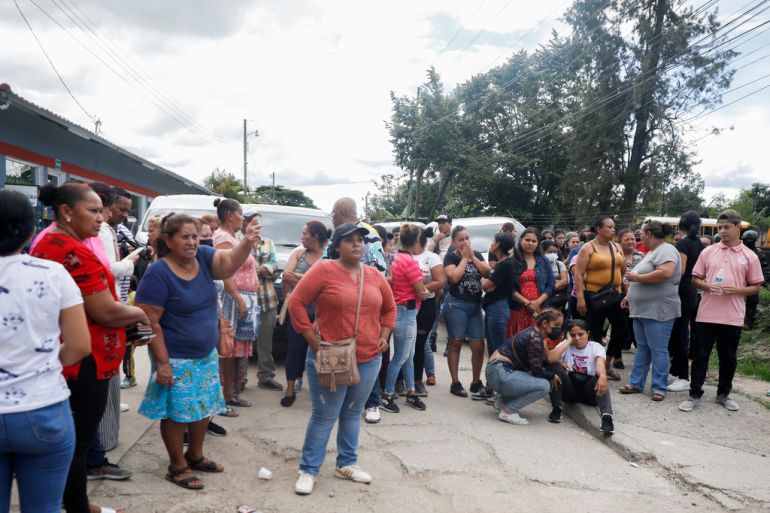Death toll rises to 46 in Honduran women’s prison gang violence
Authorities say they are working to identify bodies burned during rioting on Tuesday.

The number of people killed during a spate of rioting and fires at a Honduran women’s prison this week has risen to 46 with dozens of families waiting for the bodies of their loved ones to be released.
A government spokesperson said on Wednesday that the death toll had increased from 41 to 46. It is not clear if all of the victims were inmates.
Keep reading
list of 3 itemsAnti-corruption advocate flees Honduras after receiving threats
Police presence ramps up in Honduras under state of emergency
Yuri Mora, a spokesperson for the prosecutor’s office, said the number of dead has ticked up as authorities identified remains, some of which were “charred or reduced” to ash.
The violence allegedly broke out when a group of gang members entered a part of the prison controlled by a rival faction, shooting people and setting it on fire. The prison, called the Centro Femenino de Adaptacion Social, can hold up to 900 women.
The shooting and burning of dozens of people, one of the deadliest instances of prison violence in modern Honduran history, have underscored the substantial power held by gangs and raised questions regarding corruption within the prison system and law enforcement.
Sections of the prison, located about 20km (12 miles) from the capital, Tegucigalpa, were destroyed during the violence on Tuesday, according to Delma Ordonez, who is representing the families of the victims.
A spokeswoman for the Forensic Medicine Directorate, Issa Alvarado, said 23 of the bodies have been identified and handed over to families.
One relative, Angel Garcia, discovered his wife and two sisters had been killed in the violence. “Everything goes unpunished,” Garcia told the news agency Reuters, denouncing corruption in the prisons.
Julissa Villanueva, head of the penal system, said on Tuesday that the attack could have been linked to recent efforts by the government to crack down on the corruption.
On Tuesday, President Xiomara Castro said she was “shocked” by the “monstrous murder of women … by gangs in full view and tolerance of security authorities”.
Castro dismissed Security Minister Ramon Sabillon and is expected to announce new efforts to combat organised crime later on Wednesday.
Since December, the Honduran government has operated under a “state of exception”, which has suspended key civil liberties and given police wide discretion to make arrests in the name of combating crime.
In neighbouring El Salvador, President Nayib Bukele has used similar measures for more than a year to strike a blow against gangs that have extorted the population for years, winning substantial popularity in the process.
However, human rights groups have criticised the measures as a bid to consolidate power, crack down on dissent, and sanction crimes such as torture and extrajudicial killings.